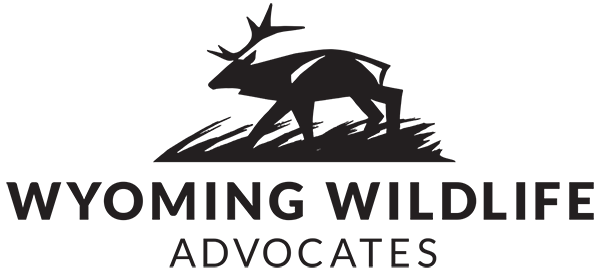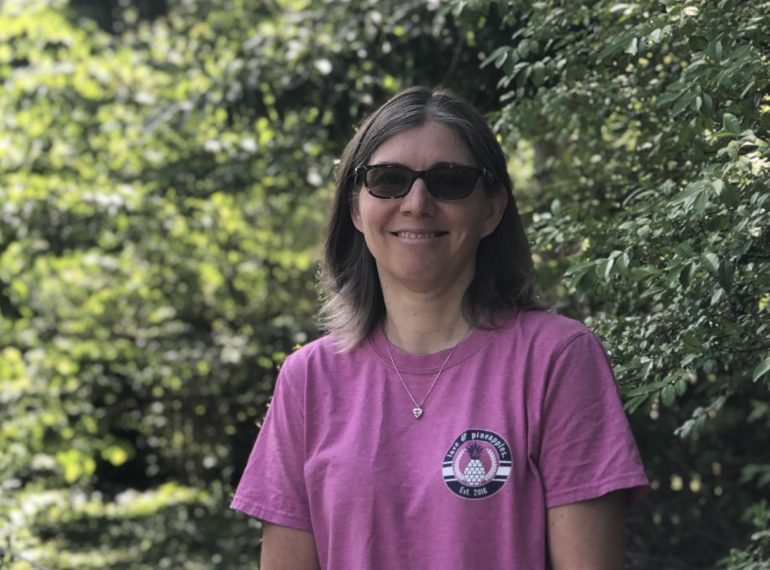We are so thankful for Jenna Henderson’s very generous service term with us this summer. Jenna was able to complete some much needed projects and has prepared our fall term AmeriCorps member with a lesson plan that we can use with local youth about coexistence with wildlife.
Jenna is a resident of North Carolina and has recently completed her degree in Environmental Education. She has one daughter, Kayley who will be seeking a wilderness therapy certification this fall.
We recently sat down with Jenna to get her thoughts on her time with WWA and where she’s hoping life will take her. Read all about her thoughts about wildlife advocacy and hope for the future below. Much gratitude for all Jenna accomplished during her term with us and we wish her all the best in the future!
What drew you to the AmeriCorps program?
I chose to be an AmeriCorps member because I love helping communities and feeling a part of something bigger than myself. I love what AmeriCorps stands for and felt that their values aligned with my own.
What is it about the Greater Yellowstone Ecosystem that interests you? Why did you choose this place to serve?
The vastness and diversity that lies within the Greater Yellowstone Ecosystem is one of the main interests to me. With over 3,000 sq miles and so many different species of wildlife, vegetation, geology, and lakes, there are so many habitats and things to learn about. It’s like one could learn their whole life about the Greater Yellowstone Ecosystem and still not know everything there is to learn about the ecosystem and all its little intricacies. I also was interested in the fire ecology of the Greater Yellowstone Ecosystem and how it has changed over the years and will continue to change. My father has worked in the fire industry my whole life so that was of interest to me. All of these things combined and the fact that I wanted to be a part of a community other than my own and make a lasting impact in that community is why I chose this place to serve.
What have you learned about wildlife issues in Wyoming so far that has surprised you?
The variety and vastness of wildlife issues within Wyoming has really surprised me. As an outsider, I like many only knew about the wildlife issues that make it to mainstream news. Wildlife issues in Wyoming go well beyond that and are so complex with such complex solutions that I was extremely surprised that more agencies did not work together to solve these issues.
What knowledge will you take with you from this experience that will help you in your career and/or conservation efforts?
The knowledge that I will take with me from this experience that will help in my career and conservation efforts is to not be afraid to think outside the box. I cannot be afraid to push limits and go after things that I want within my career. I also have learned that conservation efforts are important not only for land but for wildlife. I have immensely loved the projects that I have worked on and gained so much knowledge about various wildlife.
What has been the most rewarding part of your service?
I actually have two parts of my service that have been extremely rewarding. Knowledge that I have gained regarding wildlife and wildlife issues has been invaluable. Knowing that some of the projects I have worked on will help the community has been so inspirational. Also the friendships and relationships I have formed within WWA and AC are some that I hope will last a lifetime. The relationship that Kristin and I have formed has been especially special to me. She works so hard and I admire her as a person and professional. I only wish the community saw the value within her that I do. I think that goes unnoticed.
After learning about wildlife issues in Wyoming, what advice would you have for anyone who would like to get involved in educating themselves further?
I think that for anyone wanting to get involved in educating themselves further on wildlife issues in Wyoming, start with Wyoming Wildlife Advocates wildlife guide. That will give someone good information on local wildlife within Wyoming and issues that each wildlife may face. My next suggestion is to start learning as much as you can about the local community and how wildlife are affected by the community. Find the issue that speaks to your heart the most then learn and ask questions about that issue. Wyoming Wildlife Advocates website has many ways to get involved with wildlife issues.
What hope do you have for the future for wildlife conservation? Do you think humanity will be able to turn things around before many more species are extinct?
I do have hope for the future of wildlife conservation. Hope is the one thing we have to hold on to. By continuing to help educate and help others become advocates for wildlife in Wyoming, in my local area, and across the globe, hopefully this will help to further wildlife conservation down a more positive path.
Do you think there is hope that Wyoming will find a balance for wolves and grizzlies or do you think we are in for a few more decades of conflict?
I do have hope that Wyoming will find a balance with wolves and grizzlies. That being said, I think in order for that to happen several things have to happen. First, more agencies need to come together and work together, rather than playing the blame game. Second, agencies need to have more clarity for the public and for those trying to help with wildlife issues and realize that there is not just a wolf and grizzly issue but a people education issue. Third, the public needs to be more educated on how to deal with wolves and grizzlies effectively. Larger signs, bigger fines, and a larger aggressive education campaign is needed. I do think that if these don’t happen and soon we are in for many more years of conflict.
What advice would you have for wildlife managers or students who are studying wildlife management currently?
There are several avenues of advice that I would give for wildlife managers and students studying wildlife management. The first would be to really study and follow the science when it comes to wildlife management. Keep yourself up to date on the information. Secondly, don’t let yourself get caught up in the politics and cliques that can form in government agencies around money within wildlife management areas. Remember in the end, it’s the wildlife that should take the forefront and strive for that ultimate balance.

